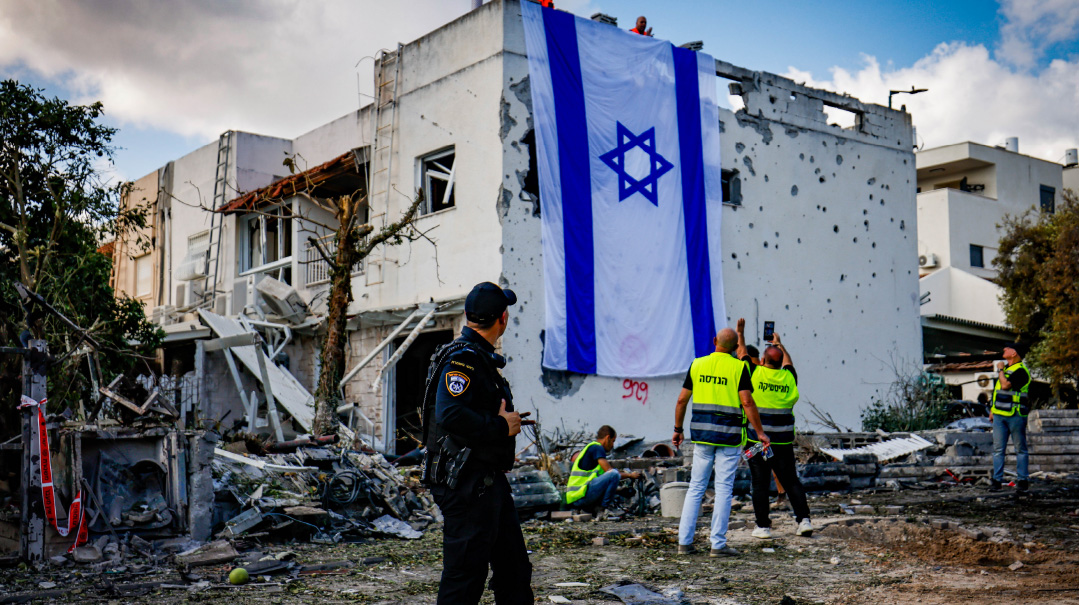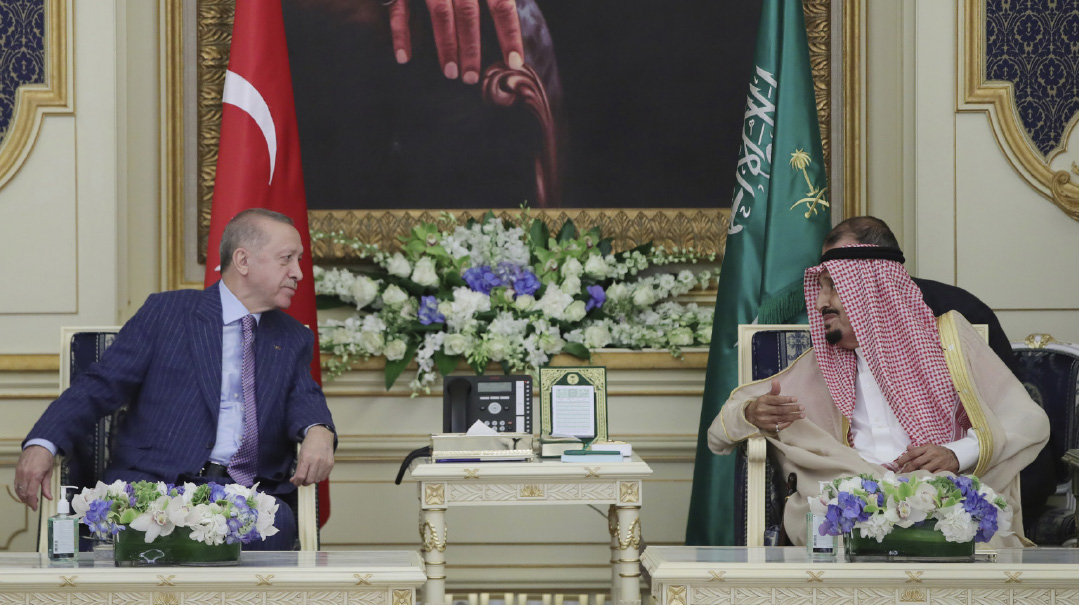Israel Turns Up the Heat

After a week of Israeli attacks, Hezbollah is on the defensive and the region stands on the brink of all-out war

Photo: Flash90
Israel’s string of tactical successes against Hezbollah over the past week has brought the two sides to a crossroads. The escalation of attacks, from the pager explosions to Friday’s airstrike on top commanders of Hezbollah’s elite Radwan force, are meant to send an unmistakable message: “Back off, or expect all-out war.” Given the terrorist group’s modus operandi until now, however, the latter scenario is looking more likely.
The realization that Israel’s hand is being forced has sunk in among its political and military echelons. The challenge is choosing the right moment and manner of the operation to minimize risks and maximize results.
The past few days have proven that the IDF is headed for escalation, whether Hezbollah is interested or not. “We can’t let Nasrallah continue to set the pace,” an IDF official told Mishpacha regarding last weekend’s attacks in Lebanon. “We’ve been locked in a painful attritionary conflict for almost a year. It’s time we take the reins into our own hands and rewrite the rules of the game.”
The almost simultaneous explosion of thousands of pager devices in Lebanon and neighboring countries last week caught even some senior Israeli defense officials off guard. That’s how secretive the operation was. According to foreign media reports, Israel felt it had no choice but to act, despite knowing it would trigger a significant escalation in the northern sector.
What began as a targeted intelligence operation quickly became a strategic turning point in the relations between Israel and Hezbollah. Some assessments have been widely reported that the exploding pagers were originally planned as the initial stage of a much wider operation, but Hezbollah began to suspect something was afoot when they noticed the devices were prone to overheating, and Israel decided to go ahead before the plot could be uncovered. The fear that Hezbollah’s investigation of the incident would reveal the explosives hidden in their radios led Israel to detonate those the very next day.
Other sources, however, maintain that this was not the case, and that Israel simply decided it needed to increase its pressure on Hezbollah with a dramatic move. Either way, Israel saw no other alternative. Whatever the reason behind it, the attack continues to resonate.
“In Arab culture, honor is a very important concept, so I imagine this attack wounded them deeply in that regard,” says IDF Colonel Gabriel Siboni, a specialist in military and strategic affairs and cybersecurity at the Jerusalem Institute for Strategy and Security. “For them, this must be a source of shame.”
And that will only accentuate the internal repercussions in Lebanon. As Eliot A. Cohen, a political scientist and former official in the Bush State Department, observed in an article in the Atlantic: “From a failure so large, witch hunts will follow... Organizations looking for spies and saboteurs, particularly after such a disaster, are unlikely to be forgiving or measured, and so a spiral of accusations, torture, and executions will likely ensue... By showing its extraordinary reach, Israel will breed internal fear and suspicion that can be more paralyzing than fear of an enemy.”
Shift of Focus
The decision to redeploy the IDF’s 98th Division to the north gives further evidence of the gravity of the situation. The 98th Division has been one of the pillars of the fighting in Gaza so far. Its redeployment to the north reflects Defense Minister Yoav Gallant’s declaration last Wednesday that “the center of gravity” of Israel’s focus has shifted north, and that a full-scale war there is increasingly likely.
These developments have occurred against the backdrop of growing frustration among the military echelon. The IDF has already set several dates for a large-scale operation in the north, but the political echelon postponed them again and again. The army’s assessment is that without significant action, the threat from the north will only intensify.
This time, the political and military echelons understood that they would have to go all in, because there’s simply no choice. Hezbollah has built up significant military capabilities, including precision missile systems and advanced combat capabilities. In addition, the elite Radwan Force’s plans for a ground invasion of Israel showed an increasing willingness on Hezbollah’s part to take bold, aggressive action. The growing strategic imperative dragged the political echelon over to the military’s view.
Friday’s elimination of key Radwan Force commanders reflected that change of heart. Radwan commanders were gathering in Beirut’s Dahiya neighborhood to discuss their “conquest of the Galilee” operation, a ground raid into Israel reminiscent of Hamas’s October 7 invasion. Part of the reason they were meeting in person, according to some reports, was that their communication system had been compromised by the pager attacks.
Not wasting the opportunity, IAF fighter jets, acting on intelligence, targeted and killed Ibrahim Aqil, Hezbollah’s head of operations and commander of the Radwan Force. Fifteen other Hezbollah commanders were killed in the attack, among them senior Radwan commander Ahmed Mahmoud Wahbi (Abu Hussein Samir), who oversaw planning for the “Conquest of the Galilee” operation, Hezbollah’s entrenchment in southern Lebanon, and training to improve its ground-fighting capabilities; and five brigade commanders of the Radwan Force, along with other senior members of the organization.
The death of Ibrahim Aqil, who had been responsible for the 1983 bombing of the American embassy in Beirut that killed 241 US Marines, caused little sadness in Washington.
“That individual has American blood on his hands and has a Reward for Justice price on his head,” US National Security Advisor Jake Sullivan said of Aqil. “He is somebody whom the United States promised long ago we would do everything we could to see brought to justice.”
Not If But When
The IDF sees a major ground operation, which now seems more likely than ever, as the only way to disrupt Hezbollah’s capabilities and push it away from the border. The IDF’s assessment is that an aerial campaign alone won’t be sufficient to achieve its strategic objectives in the north. A ground maneuver could involve pushing deep into Lebanese territory to dismantle Hezbollah’s missile systems and disrupt the organization’s command and control centers. As with Operation Swords of Iron in Gaza, the operation would also address the vast network of tunnels and underground fortifications that Hezbollah has built in southern Lebanon.
Senior Northern Command officials explained to Mishpacha in recent weeks that returning northern resident to their homes isn’t possible without a ground operation. A diplomatic solution, much hoped for by the political echelon, will not root out the problem.
“Southern Lebanon is a mire the likes of which the IDF hasn’t encountered yet,” said a senior Northern Command official. “If the tunnels of Jabaliya [in Gaza] were complex, they’re still child’s play compared to southern Lebanon. It isn’t possible to guarantee the security of the northern residents without cleansing southern Lebanon of Hezbollah, and that’s impossible without a ground incursion.”
And that incursion will have to be magnitudes or order greater than the Gaza operation, both in scale and in intensity. “Hezbollah has extensive capabilities,” warns Colonel Gabriel Siboni. “It’s a large and powerful organization, supported by Iran for many years. Israel cannot afford to underestimate Hezbollah’s strength.”
One obstacle to an operation of that size in the north is the situation in the south. The security establishment’s original assumption was that by this point, there would be a deal in place that would allow the army to divert significant resources from Gaza to the north. The continued fighting in Gaza makes it harder to do that. Despite this, the IDF nevertheless believes that a significant operation in the north is unavoidable. The question isn’t if, but when and on what scale.
What lies ahead in the short term? The general assessment is that over the next few weeks, we’ll see a gradual escalation in the northern sector. This could include an uptick in IAF airstrikes, more infiltration attempts by Hezbollah, and Israeli offensive actions against the group’s infrastructure. The IDF will beef up air defense systems and intensify its intelligence efforts.
At the same time, we can expect a continued increase in Israel’s deployment in the sector, including reinforcement of ground forces and advanced air defense systems. Preparations on the home front is no less critical. We can expect massive drills and efforts to prepare the population for an extended conflict. Hezbollah would likely attempt to target the Israeli home front in response to a large-scale military action.
Already on Motzaei Shabbos, Hezbollah responded to Israeli attacks by extending its range of fire, launching long-range rockets at targets south of Haifa, in the direction of the Jezreel Valley and Yokneam. Hezbollah clarified that the attacks were a response to the IDF’s attacks in southern Lebanon rather than to the assassinations and the pager operation, implying that this was only the beginning. The pace of launches intensified through the night, and by Sunday morning, rockets were being fired toward Kiryat Bialik and the Haifa area, in addition to the usual barrages on the entire northern sector.
And then there’s the big picture. Israel is aware of the optics of a large-scale operation in Lebanon and the potential implications for its relations with countries in the region and the international community. But the feeling among decision makers is that the international community understands the gravity of the threat and the need for Israel to protect its citizens. In the coming days, Israel will step up its diplomatic activities in order to drum up international support for its actions and try to prevent a broader regional escalation.
At the same time, the defense establishment is preparing for a variety of scenarios, including the possibility of additional elements joining the conflict, such as pro-Iranian groups in Syria and Iraq or even Iran itself. Operational plans already exist, and are being adjusted and updated in accordance with developments on the ground and fresh intelligence. And the IDF warns that it has a lengthy target list, and no one in Hezbollah should consider himself safe — not even its leader.
“Israel can reach Nasrallah,” Col. Siboni stated. “It’s only a matter of deciding when the appropriate time is.”
Israeli decision makers face a difficult choice. On the one hand, the need for action against the developing threat in the north is clear and urgent. On the other hand, a large-scale operation could have dramatic consequences, including a regional escalation. Israel’s leadership must maintain the delicate balancing act between operational necessity and broader political and strategic considerations.
As bold and creative as Israel’s actions have been over the last week, celebrations are clearly premature.
“The real victory will only come when our citizens can return to the North, and this should be seen as just one part of the process,” Colonel Gabriel Siboni of the IDF told Mishpacha. “But let’s not believe that this attack will allow our citizens to go back home or that Hezbollah will withdraw from southern Lebanon.”
(Originally featured in Mishpacha, Issue 1030)
Oops! We could not locate your form.







